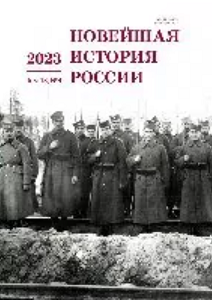Inequality of Blockade Suffering and the Nature of (Soviet) Class
Inequality of Blockade Suffering and the Nature of (Soviet) Class
Author(s): Andrew SloinSubject(s): Military history, Political history, Recent History (1900 till today), Social Theory, WW II and following years (1940 - 1949), History of Communism, Book-Review
Published by: Издательство Исторического факультета СПбГУ
Keywords: Blockade; Leningrad; World War II; survival; institutions; culture; power; resilience; social theory;
Summary/Abstract: Jeffrey Hass’ Wartime Suffering and Survival is an important study of the social history of emotions and group psychologies during the siege of Leningrad. Hass explores how Leningraders responded to the inhuman conditions of suffering, death, and starvation. Following Pierre Bourdieu, Hass examines the collective responses of different social strata to the siege, and how class was reconceptualized in terms of mental frameworks of meaning-making, rather than relations to private property ownership. His analysis reveals how entrenched class distinctions were in Soviet society, and how they impacted the strategies of survival employed by the population. By combining theory with archival documents, Hass provides an innovative approach to understanding the class-food nexus in Soviet society, and how the extreme conditions of the siege amplified the exploitative wage labor relationship. Jeffrey Hass’ work shows how theory can allow deeper access into archival documents and enrich analysis, thus offering an innovative avenue for reconceptualizing class as an agentive category. To push back on the question of class, the Marxist understanding of class is critiqued, as Marx is quite critical of the idea that class can be reduced to relations of private property. Class is instead seen as a phenomenon created through the process of proletarianization and the alienation of human labor — and not simply as one of property ownership. It is thus suggested that, in the context of hyperinflation, siege, scarcity, and threatening social breakdown, food also began to function as money, constituting part of the wage and the most desperately needed part. Read through this perspective, Jeff’s workers seem far less like a group bounded together not only by habitus and customs of thought, but also by a social system of hyper-statist domination grounded from the outset of the revolution on the wage labor form.
Journal: Новейшая история России
- Issue Year: 13/2023
- Issue No: 45
- Page Range: 819-823
- Page Count: 5
- Language: English

